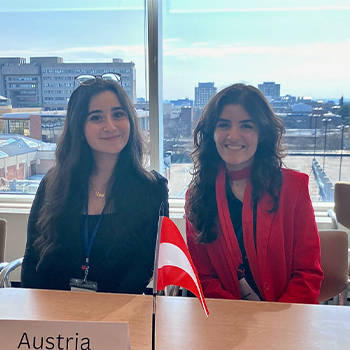When political science major Sara Harsini heard York University was hosting a Model European Union (EU) for university students nationwide, she signed up to participate and convinced her third-year classmate, Nawal Alhawari, to join her.
The Model EU, a simulation of the work done by the European governing body, was held this spring and organized by Heather MacRae, an associate professor in York U’s Department of Politics. Sponsored by the Delegation of the European Commission in Canada, it brought 55 students from across the country to the Keele Campus to experience politics and diplomacy in action.
“It was an excellent experiential education exercise,” MacRae said. “The students had to do advance work, both reading and research, and then they put it into action. They learned a lot about how the EU works and a lot about climate change.”
The event was the second of its kind to be held in Canada; last year, it was held in Ottawa. According to MacRae, the goal going forward is to have universities assume the role of hosting.
The Hungarian Consulate hosted the opening reception, an event that brought students and diplomats together to hear an opening speech by EU ambassador Melita Gabrič and to discuss the issues of the day. Many of the conversations centred around the European Green Deal – the EU climate law requiring a 55 per cent reduction of emissions by 2030 and climate neutrality by 2050 – since it was the focus of the weekend’s sessions. The students were tasked with creating a resolution, addressing how they would achieve its goals.
Students worked in pairs to represent the governments of the 27 EU nations. Alhawari and Harsini chose to represent Austria, because they wanted to embody a nation that was forward thinking in its environmental policies. After researching green policies and Austria’s contribution to the EU, they were delighted to meet a representative from the Austrian Consulate at the reception.
“It was fantastic to meet him and discuss Austria’s green policies,” said Harsini. “A major part of our success came from his commentary and insights.”

Gabriele Alexandru, head of the political, press and information section at the EU Delegation to Canada, gave the opening talk the following day, before the students got to work on their Green Deal resolutions. The event was entirely student run, with a pair from the University of Victoria acting as Chairs.
“It’s an opportunity to hone so many skills, including negotiation, co-operation, public speaking and research,” MacRae said. “There’s an extra benefit getting to know people interested in similar issues from across the country. We’re building a community of European scholars.”
This was the first time Alhawari and Harsini had participated in a simulation exercise. They thoroughly enjoyed the experience and are considering trying a Model United Nations simulation next.
“We always have a notion that government work takes too long, but this shed light on the fact that every nation’s voice had to be heard,” said Harsini. “Now, I understand why it takes time.”
Added Alhawari, “The actual Green Deal already exists, so we were just adding to it. I realized that if the real EU was able to forge an agreement, so could we.”
MacRae liked the idea of giving students a sponsored opportunity to learn more about the EU.
“There is an EU study tour each summer, which our students can take part in, but it is expensive,” she said. “Since not all students can afford to go to Europe, we bring Europe to them.”
J.J. McMurtry, dean of York University’s Faculty of Liberal Arts & Professional Studies (LA&PS), believes the exercise was extremely valuable.
“Participating in opportunities such as the Model EU simulation is a vital component of experiential learning and internationalization at LA&PS,” he said. “These experiences enhance students’ understanding of global affairs, cultivate critical thinking, communication and collaboration skills. By actively participating in these activities, our students not only enrich their academic pursuits but also develop the necessary competencies to thrive in an increasingly interconnected and diverse world.”
By giving students a greater understanding of European governance, MacRae is helping to fulfil the University Academic Plan‘s goal of advancing global engagement and bring its new Internationalization and Global Engagement Strategy to life.
Originally published in YFile.
